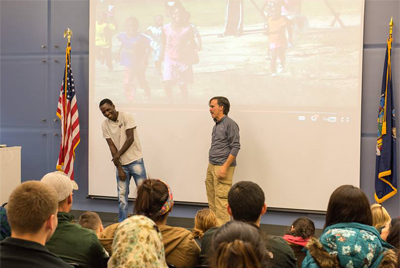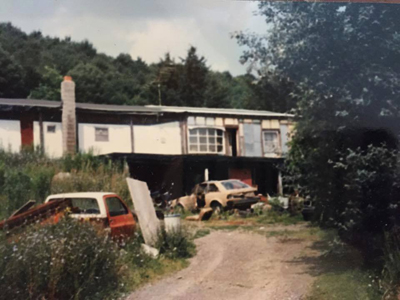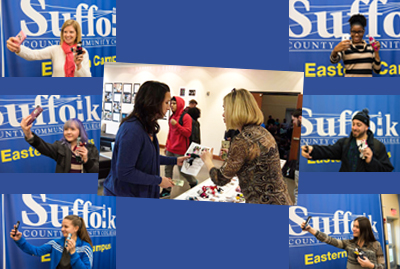December 2015
I expected to learn from our Zimbabwean guests something about how abject poverty impacts the lives of orphaned children in Bulawayo. I did not expect to learn something about how abject poverty has impacted me as an academic unionist. On December 2-3, Dennis Gaboury, the American sculptor who founded ZimKids Orphan Trust, and Tinashe Basa, the ZimKids director, visited the Eastern Campus to speak about the good work they do running an educational center in one of the poorest nations on earth—a place that was built by orphans and run by orphans for orphans. I first met these gentlemen when they presented at my sons' school on November 13 (and immediately decided to work with student groups to bring them to the Eastern Campus through a Lyceum Grant). Watching them talk about their work with a group of elementary children and parents was a powerful moment for me. No doubt many in the audience were likewise moved, but the minute I got in my car it felt like I had been kicked in the gut.
You see, as a forty-something professor and long-time union activist, I like to think I know a few things. But listening to Dennis and Tinashe really hit me hard. All my life I've carried a secret shame about where I come from. I grew up in a trailer in the weeds of upstate New York. We availed ourselves, for some time, of government rice and cheese to supplement whatever could be shot in the woods or grown in the garden. On Saturday mornings, while my classmates were cuddled up in pajamas watching cartoons, my family was at the town dump, breaking open trash bags with sticks to see what we could salvage. My sisters and I shared clothes so as not to repeat "outfits" too often. This was my home until age 15, when authorities pulled me from that place for my own safety because I stupidly went to school one morning after my mother confused my face with a punching bag. Here's why I think listening to Dennis and Tinashe talk about ZimKids had such an effect on me: there are important lessons we academic unionists can learn from these Zimbabwean orphans. What attracted me to get involved in my first faculty union, the Mohawk Valley Community College Professional Association, in 1998 was their deep commitment to social justice in the blue collar community of Utica. It resonated perfectly with why I like teaching at a community college: the feeling of having a direct, positive impact on others' lives. When students talk about their messy lives or their desperation for scholarships, I know exactly what they mean. I've been homeless. I've been hungry. I've been desperate for financial support via any means. From ZimKids, I've realized that this is ridiculous. This does have to do with me. And with you. With all of us. As educators and as unionists, we have an obligation to make these issues explicit, to not present them as if from an ivory tower. We can also learn a lot from how similar ZimKids Orphan Trust is to unionism in its founding principles and social justice mission. When they come to ZimKids, they find a place of safety and stability. It takes a while for the ZimKids staff to get new arrivals to trust them, but most come around. ZimKids offers education and vocational training for the children. True to their mission of being run by orphans for orphans, the older ZimKids teach the younger ones; they tutor them and teach them to read. The staff of the new preschool are former ZimKids who are now reaching out to the littlest ZimKids. Vocational training includes computer skills, construction skills, carpentry, gardening, and sewing and welding which are important, marketable skills in Zimbabwe. Given the harsh economy there, ZimKids takes steps to effect positive social change. For example, they offer a girls' welding class due to many Zimbabweans' resistance to hiring women because if the only skilled welder in the area is a young woman that's who will get hired.
In addition to their profound commitment to social justice through education and training, ZimKids recognizes the need for all humans to appreciate the arts and to celebrate life. Thus, the "elder" ZimKids (beneficiaries over the age of 14) plan, schedule and direct the daily recreational activities, including chess, dance, choir, sports, visual arts and performing arts. This is a haven from the toughest streets in Pumula North, Bulawayo. The children, who make dolls and toys for their own play, are asked to make an additional 12 dolls or wire toys each year, which Dennis and Tinashe bring to the United States as a thank you to donors who also receive a brief biography and photo of the toymaker. Donors are encouraged to take a "selfie" with the doll and send it back to the dollmaker as a way to initiate a pen pal relationship. One hundred percent of the proceeds are taken directly back to Zimbabwe by Dennis to avoid theft in the mail. ZimKids learn that they all have a responsibility to contribute to their own well being. They don't live by charity and handouts; each ZimKid learns the dignity of using their own two hands to keep ZimKids growing. A good union does the same. Good unions work to get as many members involved in the life and vitality of the union as possible. We cannot take for granted the safety and stability we enjoy. Good unions show how everyone in the bargaining unit has a responsibility to take care of everyone else in the union, from adjuncts to full timers, from classroom faculty to PAs to coordinators to librarians to specialists. Like the newly arrived orphans at ZimKids, it sometimes takes time and effort to ensure that we can trust and will support one another. But we must. We find strength through unity. We also need to talk with our students and with one another openly and honestly about the diverse places we come from. We need to work together to create positive social change. Together we need to celebrate the arts and celebrate life. Postscript: No need to feel sorry for me. I have a great job with terrific colleagues. My work with students and my union work are tremendously fulfilling. And the family I've created for myself is happy, healthy and loving. I'm among the lucky few—way too few—in this country who have enjoyed significant upward social mobility, and I see my union work and my teaching as two avenues by which to help others do the same. |



